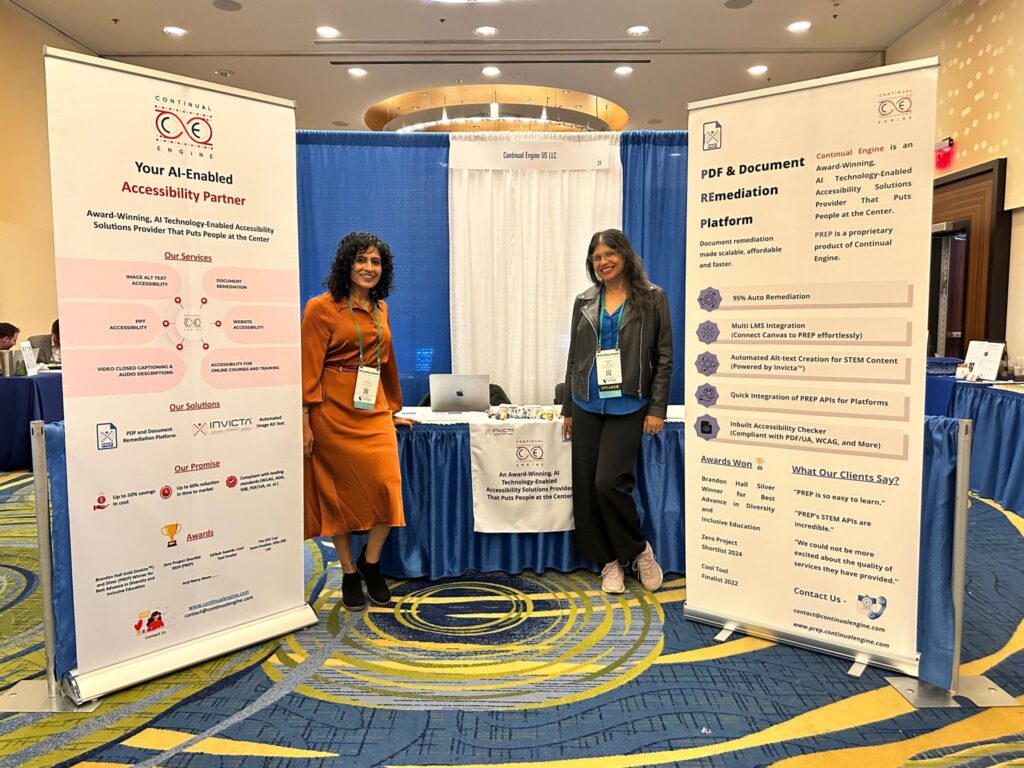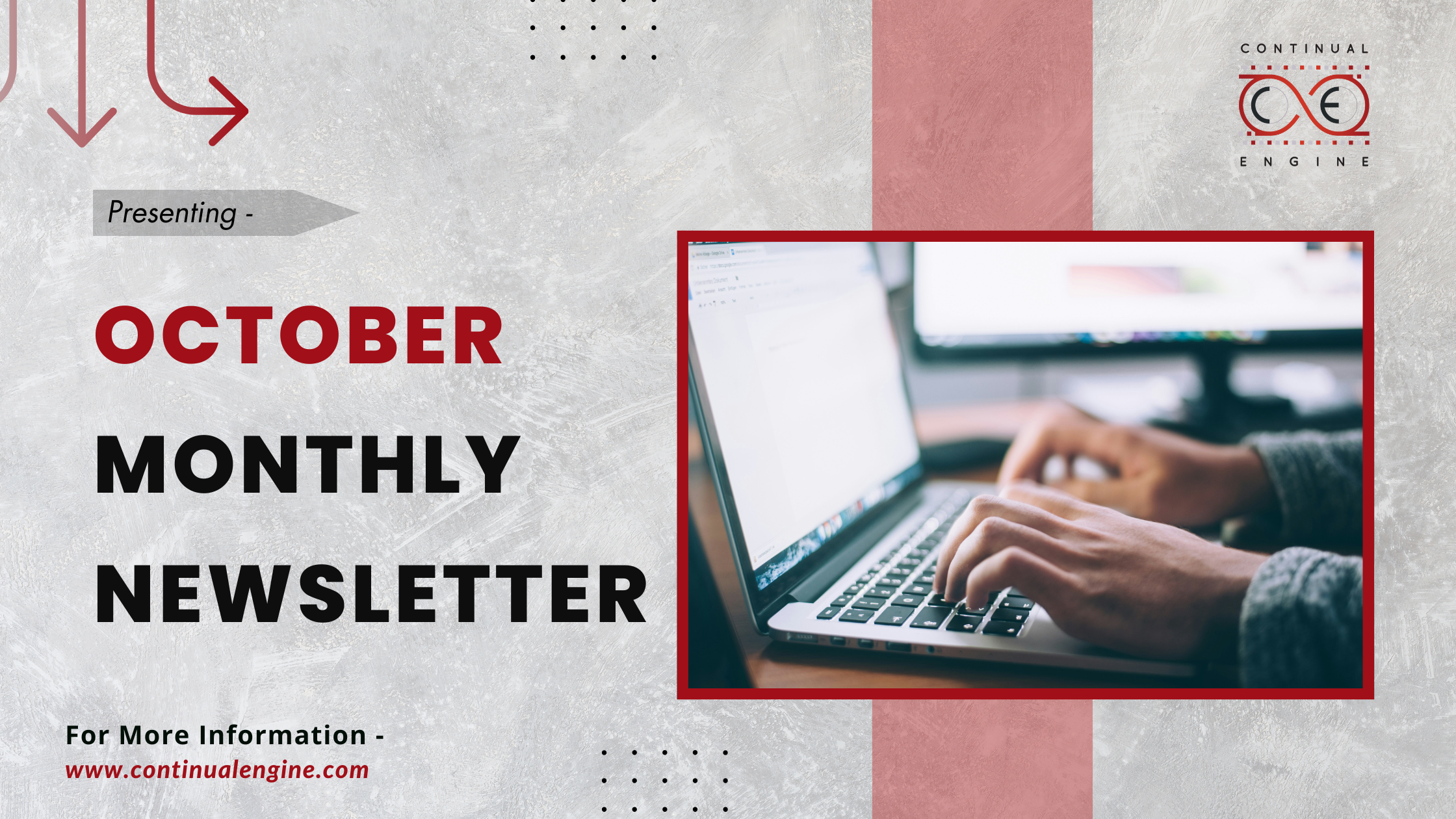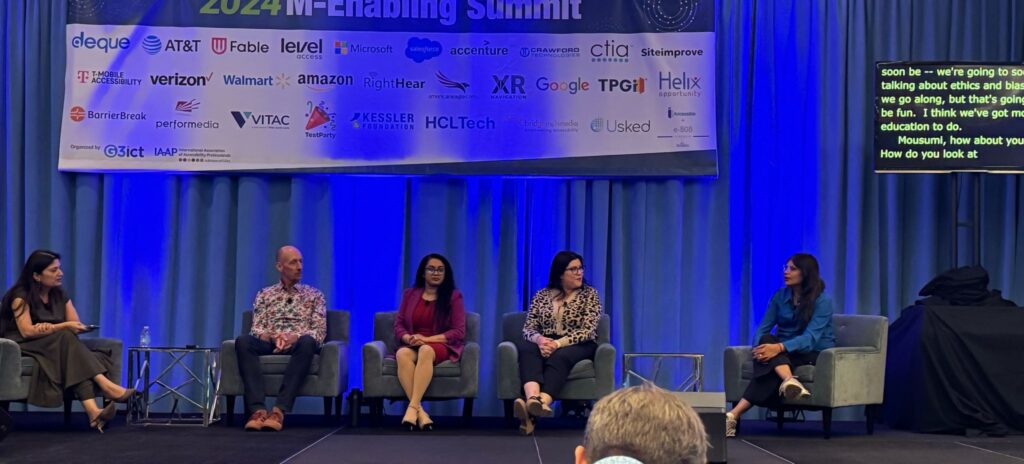Dear Valued Readers,
We invite you to discover the latest updates in accessibility and AI with Continual Engine’s October Newsletter! This edition brings you a curated selection of articles and insights on cutting-edge trends, keeping you informed and inspired.
- Star News of the Month – Continual Engine and Stanford University Unite for Accessibility
- Gain Insights from our Latest Blog on Accessibility: 2024 Trends in Corporate PDF Accessibility & Compliance, and What is OCR for Accessibility?
- Upcoming Event: Continual Engine will be Presenting and Exhibiting at the AHG Conference 2024
- Past Events Include: Continual Engine’s Webinar on Document Accessibility: 2024 Insights & Best Practices, and Continual Engine’s Presentation and Exhibition at the 2024 M-Enabling Summit
- Discover the Latest News Articles that Include: Assistive Tech Shines at Paris 2024 Paralympics, AI Advances Accessibility for the Blind, Princeton Launches Campus Access Guides, Cities Urged to Improve Fringe Venue Accessibility, U.S. Expands Access in Art, Voting, Public Spaces, FCC Mandates Video Conference Accessibility, FDA Approves Over-the-Counter Hearing Aid Software, Section 504 Updates Clarify Accessibility Rules, AI Helps Cities Enhance Intersection Accessibility, Maine Simplifies Voting for Voters with Disability, Google Calendar Adds Accessibility Updates, Nestlé Creates Accessible QR Codes for People with Vision Impairment, Accessible Maps for Colorblind Scientists, and San Francisco Fights for Accessible Ride-Share
We aim to deliver compelling, insightful, and relevant information about accessibility and compliance through these newsletters. We welcome any feedback or questions.
Warm Regards, Continual Engine
I. STAR NEWS OF THE MONTH
1. New Collaboration : Continual Engine and Stanford University Unite for Accessibility
Continual Engine is pleased to announce our partnership with Stanford University to provide comprehensive document and PDF remediation across its campus. This collaboration aligns seamlessly with Stanford’s commitment to diversity, equity, and inclusion, enhancing document accessibility across its digital platforms.
Through our PDF and document remediation services, we are supporting Stanford’s mission to create an inclusive online environment where everyone, including individuals with disabilities, can fully engage in the university’s research, education, and social initiatives.
This partnership will enable Stanford University to expand accessible documents in various formats, ensuring compliance with globally accepted accessibility standards. Together, we’re fostering a more inclusive learning experience, empowering all Stanford community members to access information easily.
II. LATEST BLOGS ON ACCESSIBILITY
III. UPCOMING EVENT
1. Continual Engine will be Presenting and Exhibiting at the AHG Conference 2024
Continual Engine is thrilled to announce our participation in the 27th Annual Accessing Higher Ground Conference 2024! Join us in Denver, Colorado, where Continual Engine will be presenting a session on PREP, and showcase our innovative accessibility solutions at our booth.
🎙 Session Highlight: Discover how PREP achieves 95% AI-driven automation for PDF accessibility, raising accuracy to new levels 📅 When: Thursday, November 14, at 1:45 pm
During our session, our SVP of Growth & Strategy, Vijayshree (VJ) Vethantham, will dive into PREP’s latest advancements, revealing how this solution reduces manual workload, supports multiple languages, and is transforming accessibility across industries, from education to enterprise.
If you’re planning to attend, we invite you to join our session and visit our booth! To schedule a meeting with our leadership team, reach out to us at contact@continualengine.com. We look forward to connecting at the conference!
Continual Engine recently hosted an insightful webinar on document accessibility, led by Kristin Yokota, AVP of Sales at Continual Engine, and Ken Nakata, Principal at Converge Accessibility. The event was a success, with engaged attendees participating in an interactive Q&A session, where our guests answered the thoughtful questions regarding the future of document accessibility.
In case you have missed attending the webinar, we invite you to watch the recording. Click here to download and view the webinar recording. For any questions, feel free to reach out to us at contact@continualengine.com.
2. Continual Engine Presented and Exhibited at the 2024 M-Enabling Summit
Our CEO and Founder, Mousumi Kapoor, was a panelist, alongside other accessibility professionals. The panel shared their different perspectives focused on the practical applications of AI tools to enhance accessibility, providing developers with a comprehensive view of both proprietary and open-source solutions. Attendees were able to get insights on best practices for integrating AI into their projects, as well as understand the advantages of various AI solutions.

We are grateful to everyone who joined our session and visited our booth, making the event a rewarding experience for all. If you have any questions, or would like to learn about our end-to-end digital accessibility solutions and services, feel free to reach out at contact@continualengine.com.
V. NEWS ARTICLES ON ACCESSIBILITY
1. WHO and the International Paralympic Committee Team Up to Highlight Power of Assistive Technology at Paris 2024 Paralympics
The World Health Organization (WHO) and the International Paralympic Committee (IPC) are joining forces to highlight the transformative impact of assistive technology on sports during the Paris 2024 Paralympic Games. The “Equipped for Equity” campaign emphasizes the crucial role of assistive technology for Paralympic athletes to advocate for concerted global action to improve access to these essential health products.
2. How AI and Other Technologies are Making the World More Accessible to the Blind
Andrew Leland’s book, “The Country of the Blind: A Memoir at the End of Sight,” made it on many 2023 year-end best literary lists, including The New Yorker’s. Leland documents how his diminishing vision changes his relationship with technology, making it both more challenging to access and increasingly important to his independence.
3. Princeton Launches Digital Access Guides for More Than 200 Buildings, Advancing Physical Accessibility on Campus
To help ensure people with all abilities can thrive on campus, Princeton has launched an innovative digital guide that provides physical accessibility information for over 200 University buildings. The Princeton Accessibility Guides(Link is external) feature nearly every building on campus, including academic and administrative buildings, residential colleges, and parking and athletic facilities.
4. When Even Fringe Festival Venues Exclude People with Disability, Cities Need to Act on Access
It’s about time city councils did more to make our cities accessible. I recently tried to buy tickets to two Sydney Fringe Festival events, only to be told by the box office that the venues were not wheelchair-accessible. Sydney remains a place where people with disabilities feel like they don’t belong. The same is true of other Australian cities. But local councils don’t bear all the blame.
5. Expanding Access: From Art to Voting, Initiatives Across the U.S. Push for Greater Inclusivity in Public Spaces and Services
As of October 2024, public services websites in the UK will now be monitored for WCAG 2.2 level AA compliance. The UK government has published updates to its Design System website to help public agencies comply with these new requirements.
6. The FCC Adopts New Rules to Improve Accessibility on Video Conferencing Services Like Zoom and Microsoft Teams
The U.S. Federal Communications Commission (FCC) recently adopted new rules to improve accessibility for video conferencing services. This builds on last year’s clarification from the FCC that interoperable video conferencing services (IVCS) — like Zoom and Microsoft Teams — are governed by FCC accessibility requirements for advanced services and equipment.
7. FDA Authorizes First Over-the-Counter Hearing Aid Software
Today, the U.S. Food and Drug Administration authorized the first over-the-counter (OTC) hearing aid software device, Hearing Aid Feature, intended to be used with compatible versions of the Apple AirPods Pro headphones. Once installed and customized to the user’s hearing needs, the Hearing Aid Feature enables compatible versions of the AirPods Pro to serve as an OTC hearing aid, intended to amplify sounds for individuals 18 years or older with perceived mild to moderate hearing impairment.
8. New Updates to Section 504 Clarify Nondiscrimination and Accessibility Mandates
To counter biases and stereotypes rooted in discrimination against people living with disabilities, earlier this year the Department of Health and Human Services (“HHS”) published a final rule, Nondiscrimination on the Basis of Disability in Programs or Activities Receiving Federal Financial Assistance (the “Rule”), which became effective on July 8, 2024. Federal grantees – including hospitals and health systems – should take heed of these changes and adjust their processes to ensure compliance.
9. This AI Tool Could Help Cities Improve Accessibility at Intersections
Researchers at Utah State University are developing an AI tool to identify accessibility issues at intersections, which could make it easier for cities to find and fix those issues. There are many features intersections use for convenience and accessibility — walk signs with visual and verbal cues, curb ramps with textured bumps, and clearly marked crosswalks, to name a few.
10. How Maine is Making it Easier for Voters with Disabilities to Participate in Elections
There can be many barriers to voting for people with disabilities, from transportation to filling out a paper ballot, but the Maine Department of the Secretary of State wants to ensure that all eligible voters can participate in elections. .
11. New Design and Accessibility Improvements for Embedded Google Calendars
Users currently have the ability to add an interactive version of their Google Calendar to their website, and add buttons for their website visitors to save their calendar events.
12. Nestlé Moves to Assist Consumers with Sight Loss in Forging Accessible QR Codes
A notable move to assist consumers with sight loss has been made by Nestlé Confectionery, which is trialing Accessible QR codes for its flagship KitKat and Quality Street, which will enable greater ease of access for customers, writes Neill Barston. The two core brands have remained firm favorites with shoppers among all age groups, with the business recently reporting strong sales across its chocolate portfolio, which has also focused increasingly on sustainable sourcing and recyclable packaging measures.
13. A Visionary Approach: How a Team Developed Accessible Maps for Colorblind Scientists
Imagine having to do your job, but not being able to visually process the data right in front of you. Nearly 8% of genetic males and 0.5% of genetic females have some form of Color Vision Deficiency (CVD), or the decreased ability to discern between particular colors. CVD is commonly referred to as color blindness.
14. San Francisco Rallies Against Ride-Sharing Apps’ Lack of Accessibility Provisions for Blind Passengers
People who are blind and their supporters rallied Tuesday against Uber and Lyft in San Francisco, claiming the ride share apps discriminate against them. The National Federation of the Blind led Tuesday’s rally, and its members told NBC Bay Area they hope to draw more attention to what they say is the companies’ failure to stop discriminations against blind individuals, particularly those accompanied by guide dogs.

